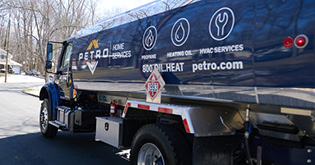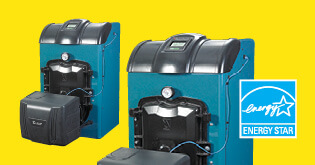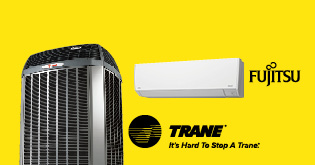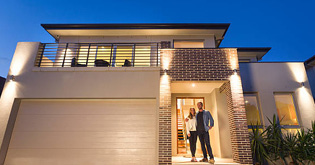- My Account:
- Sign In
- Register
- Make Payment
Articles.
Below are the categories for any articles that are published on our website. You can find articles on topics ranging from heating oil, propane, heating equipment, cooling, and much, much more. Our Home section also contains important tips, insightful facts and helpful how-to guides on lots of topics about everything from energy efficiency to important safety tips for taking care of your home and family. We also update our Featured Articles section with our newest and most relevant seasonal content to help you with your home services throughout the year. Check them out below...
Featured articles.
Air conditioner not cooling and other common AC problems.

Dealing with common AC problems during the summer months can disrupt your home comfort. From air conditioners not cooling to system breakdowns, it's crucial to address these issues promptly. You can rely on Petro Home Services for expert diagnosis and repair solutions for a range of AC unit issues, ensuring your cooling system operates effectively and efficiently throughout the summer.
What causes common AC problems?
Central air conditioning systems are intricate, comprising more than just the condenser unit that sits outside your home. Over time, any of these components can fail or wear down, necessitating AC repairs or parts replacement. Common issues include drainage problems, air filter clogs, and compressor failures. While some issues may be resolved with a simple AC tune-up, others may require more extensive repairs.
My AC won't turn on!
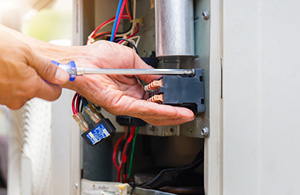
If this happens, first check your unit outside to determine if the condenser in the outside unit is running. Make sure that the unit is plugged in and the thermostat is on. If you notice your home is a little hotter than normal, be sure it is set to cool. If your air conditioner still won’t start or you notice a coil is frozen, you may have an issue with mechanical parts like the motor or compressor. It is always recommended to contact an AC specialist to service your system. One of the most common reasons your AC won’t turn on is:
Condenser unit clog – Dirt, grass and other airborne particles can get caught between the unit’s fan fins, clogging the coil. A dirty coil can lead to continued lack of cool air, and in more extreme cases, a complete shutdown of the AC system or damage to the compressor from excessive use. If your AC isn’t blowing cool air, it’s best to contact a professional.
Why is my air conditioner on but not cooling?
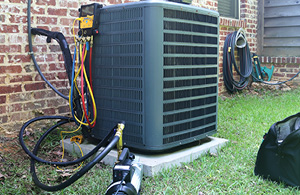
If this occurs, the problem could lie within a specific component or function of your system. Repair costs can escalate quickly, making it crucial to ensure your AC unit is maintained regularly to prevent unexpected breakdowns.
These are more of the most common central air conditioner problems:
Malfunctioning thermostat.
This controls the regular temperature in your home. When checking your thermostat, make sure you can see that it's on the correct setting for the whole house or even individual rooms. Lightly clean the inside of any dust and other particles, and try to keep your thermostat out of direct sunlight for easier reading and a longer device lifespan.
Broken fuses and breakers.
These protect the AC unit’s compressor or motor by preventing the unit from overheating. If your AC system’s motor dies, one of the first parts technicians inspect is the breaker to see if it's still operational. A certified technician can help determine the right kind of new breaker and install it.
Clogged air filter.
This is one of the most common reasons that can lead to an air conditioner not working. An air conditioner’s air filter captures most kinds of dust, dirt, and any particles that pass through the handler unit. A good way to tell if a filter should be cleaned is to check if you can see any light passing through it. If not, it’s almost certainly time to clean your AC filter. Dirty filters reduce the airflow and can cause the AC unit to freeze, especially if running overnight.
Leaking refrigerant.
If coolant begins to leak in your air conditioner, the unit will stop functioning correctly, and your home’s temperature may start to fluctuate. Depending on the leak’s location, the repair cost can vary, so it’s important to get the refrigerant of your AC inspected by a professional annually.
Corroded evaporator coils.
These absorb ambient heat from the air and propel it back into the house as cold air via air ducts. While these coils can corrode over time, if they’re located inside, they may only require standard maintenance once every few years.
Clogged drain line.
The drain line can become clogged with dirt, dust, and other small particles. When clogged, the unit’s drain pan will fill up and there’s a higher chance that water will begin to leak out with the potential to cause damage to the unit.
Damaged AC compressor.
The compressor delivers energy to the refrigerant material and sends it across the coils to transfer the heat and help the unit run. If the compressor is faulty or damaged, the AC unit will be unable to cool your home. If the unit needs more refrigerant, the compressor will become too hot, eventually, seize up, and stop working. With too much refrigerant it will slide back to the compressor, which can make it break down.
How to prevent future AC problems.
The best way to prevent AC problems is to regularly maintain your AC system. An annual tune-up will make sure that your system is checked by an expert AC technician. Most AC tune-ups will check and test all AC components to highlight any potential problems, provide an opportunity to get them resolved and make sure that you have a functioning AC system and problem-free summer.
We’re the HVAC experts that can handle all your AC repair needs.
Whether your AC system seems to freeze up, is damaged, or doesn’t turn on, the experts from Petro Home Services are always here to help. While it’s critical for your home’s comfort, it’s also important for the long-term function of your AC system. With AC repair services from New England to Maryland, D.C., and Virginia, Petro helps keep customers comfortable at home all year-round. Contact Petro today to learn more about our AC repairs and services.

